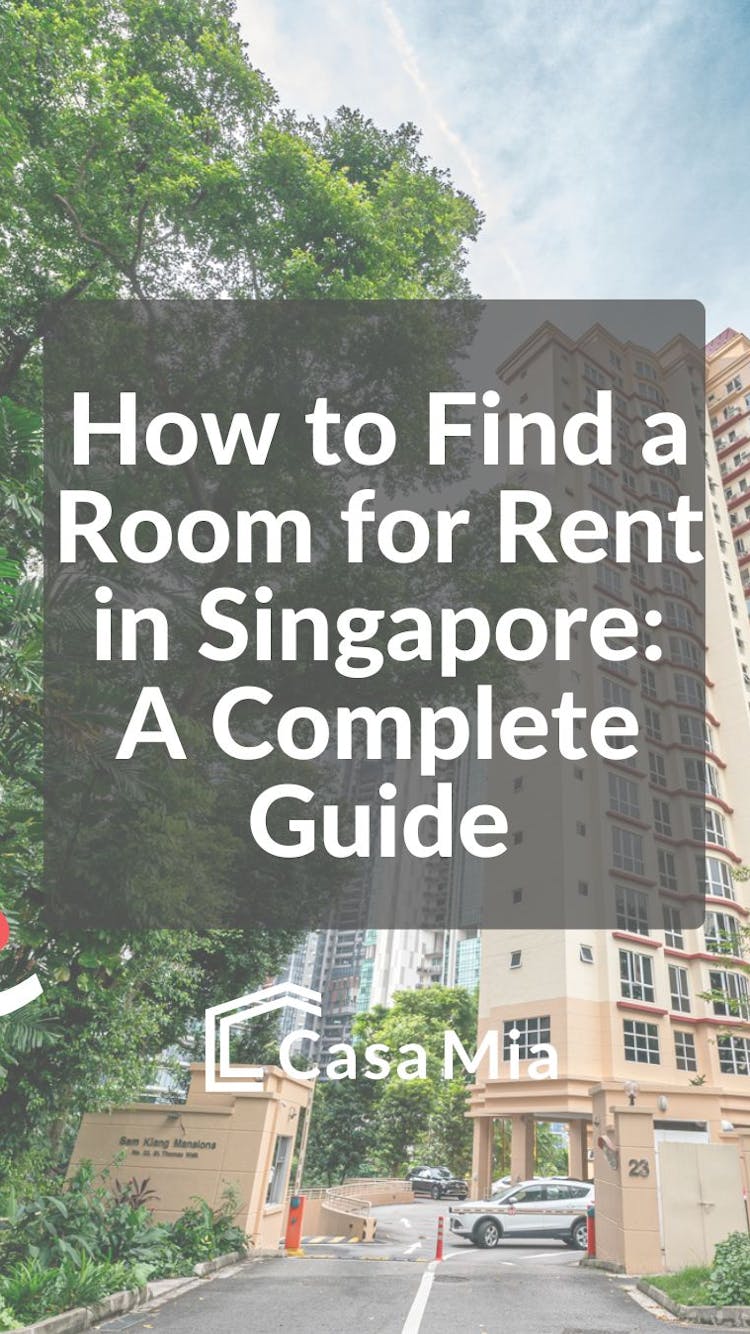How to Find a Room for Rent in Singapore: A Complete Guide

11 Mar 2025
Finding a room for rent in Singapore can be exciting but challenging. Understanding the rental market, costs, and best neighborhoods helps in making the right choice. Casa Mia Coliving simplifies the process with fully furnished, hassle-free coliving spaces tailored to your lifestyle.

Finding a room for rent in Singapore can be an exciting yet daunting task. With its vibrant culture, bustling economy, and diverse neighborhoods, Singapore offers a unique living experience. Whether you're a student, a young professional, or someone looking to relocate, understanding the rental market is crucial. In this article, we'll explore various aspects of renting a room in Singapore, including tips on finding the right place, understanding the costs involved, and navigating the rental process.
Understanding the Rental Market
The rental market in Singapore is dynamic and can vary significantly depending on the location, type of accommodation, and current demand. It's essential to familiarize yourself with the different neighborhoods and their characteristics to make an informed decision. Factors such as proximity to public transport, availability of amenities, and overall lifestyle preferences play a crucial role in determining the best fit for potential renters. Additionally, understanding the seasonal fluctuations in rental prices can provide valuable insights into when to secure a lease at a more favorable rate.

Popular Neighborhoods for Renters
Some of the most sought-after areas for renting a room in Singapore include:
- Orchard Road: Known for its shopping and entertainment options, Orchard Road is a vibrant area that attracts many young professionals. The bustling atmosphere is complemented by a variety of dining options, from high-end restaurants to cozy cafes, making it a hub for social activities.
- Bugis: With its mix of modern and traditional elements, Bugis is popular among students and expatriates, thanks to its proximity to educational institutions and public transport. The area is also famous for its street markets and cultural heritage, offering a unique blend of experiences that appeal to diverse demographics.
- East Coast: This area offers a more laid-back lifestyle with beautiful beaches and parks, making it ideal for those who enjoy outdoor activities. The East Coast Park is a favorite among locals for cycling, jogging, and picnicking, providing a perfect escape from the city’s hustle and bustle.
Types of Accommodation
In Singapore, you can find various types of accommodation, including:
- HDB Flats: These public housing flats are the most common type of accommodation and come in various sizes and configurations. They are often equipped with essential amenities and are located within vibrant communities, fostering a sense of belonging among residents.
- Private Apartments: These offer more amenities and privacy, often catering to expatriates and professionals. Many private apartments come with facilities such as swimming pools, gyms, and 24-hour security, appealing to those who prioritize comfort and convenience.
- Shared Rooms: A cost-effective option, shared rooms allow you to live with others, making it easier to meet new people. This arrangement is particularly popular among students and young professionals, as it promotes a communal living experience while keeping rental costs manageable.
As you explore your options, it's also worth considering the impact of the COVID-19 pandemic on the rental market. Many landlords have become more flexible with lease terms and rental prices due to the changing demand dynamics. This shift has opened up opportunities for renters to negotiate better deals or find accommodations that may have previously been out of reach. Additionally, the rise of remote work has led some individuals to seek out larger living spaces or homes in quieter neighborhoods, further diversifying the rental landscape in Singapore.
Cost of Renting a Room
Understanding the costs associated with renting a room in Singapore is vital for budgeting. Prices can vary widely based on location, type of accommodation, and amenities offered. The dynamic real estate market in Singapore means that potential renters must stay informed about trends and fluctuations in rental prices to make the best financial decisions.
Average Rental Prices
As of 2025, the average rental prices for a room in Singapore are approximately:
- Shared Room: SGD 600 - SGD 1,200
- Private Room: SGD 1,000 - SGD 2,500
- Master Bedroom: SGD 1,500 - SGD 3,500
Prices can fluctuate based on factors such as proximity to MRT stations, shopping centers, and other amenities. It's always a good idea to compare prices across different neighborhoods to find the best deal. For instance, areas like Orchard and Marina Bay tend to have higher rental prices due to their central locations and vibrant lifestyle offerings, while neighborhoods further from the city center, like Woodlands or Sembawang, may provide more affordable options without sacrificing too much in terms of accessibility.
Additional Costs to Consider
When renting a room, it’s essential to consider additional costs that may arise:
- Utilities: Depending on your rental agreement, you may need to pay for utilities like water, electricity, and internet separately.
- Deposit: Most landlords require a security deposit, typically equivalent to one month’s rent, which is refundable at the end of the lease.
- Agent Fees: If you use a real estate agent to help you find a room, be prepared to pay a fee, usually equivalent to half a month’s rent.
Moreover, renters should also be aware of potential maintenance fees, especially in condominiums or serviced apartments, where shared facilities like gyms and pools may incur additional costs. It’s also prudent to consider the cost of furnishings if the room is not fully furnished, as this can add a significant amount to your initial expenses. Lastly, understanding the terms of your lease agreement is crucial, as some landlords may impose restrictions on guests or require additional fees for late payments, which could impact your overall living experience and budget.
Finding the Right Room
Once you have a clear understanding of the rental market and costs, the next step is finding the right room. Here are some tips to help you in your search.
Online Platforms and Resources
There are numerous online platforms where you can find available rooms for rent in Singapore. Some popular websites include:
- Casa Mia Coliving: A platform to find shared rooms in apaprtments across Singapore.
- PropertyGuru: A comprehensive real estate platform that lists various types of properties, including rooms for rent.
- 99.co: Another popular site that offers a user-friendly interface for searching rental listings.
- Facebook Groups: Many communities have dedicated groups where landlords post available rooms. Joining these groups can provide you with more options.
Networking and Word of Mouth
Sometimes the best opportunities come from personal connections. Talk to friends, colleagues, or classmates about your search for a room. They might know of available spaces or can connect you with landlords directly.
Additionally, networking events and community gatherings can also be great places to meet people who might have leads on available rooms.
Navigating the Rental Process
Once you've found a potential room, it’s essential to navigate the rental process carefully. Here’s a step-by-step guide to help you through it.
Viewing the Room
Before committing to a rental, always arrange a viewing. This allows you to assess the condition of the room and the property as a whole. During the viewing, consider the following:
- Check for any signs of damage or maintenance issues.
- Ask about the amenities included, such as furniture, air conditioning, and laundry facilities.
- Get a feel for the neighborhood and nearby facilities, like supermarkets and public transport.
Understanding the Lease Agreement
Once you decide to rent the room, you’ll be presented with a lease agreement. It’s crucial to read this document carefully before signing. Pay attention to:
- The duration of the lease and any penalties for early termination.
- Rules regarding guests, pets, and shared spaces.
- Details about the payment schedule and deposit return policy.
Living in a Shared Space
Renting a room often means sharing a living space with others. While this can be a great way to meet new people, it also comes with its own set of challenges. Here are some tips for making the most of your shared living experience.

Establishing House Rules
When moving into a shared space, it’s essential to establish house rules with your housemates. This can include:
- Cleaning schedules to ensure common areas are kept tidy.
- Quiet hours to respect each other’s need for peace and quiet.
- Guidelines for guests to avoid any misunderstandings.
Having these discussions upfront can help prevent conflicts down the line and create a more harmonious living environment.
Communication is Key
Open communication is vital in a shared living situation. If issues arise, address them promptly and respectfully. Whether it’s about sharing chores or noise levels, having a candid conversation can often resolve misunderstandings before they escalate.
Tips for a Smooth Transition
Moving to a new place can be both exciting and stressful. Here are some tips to ensure a smooth transition into your new room.
Plan Your Move
Planning your move can help reduce stress. Consider the following:
- Create a checklist of items you need to pack and move.
- Schedule your move during off-peak hours to avoid traffic.
- Consider hiring a moving service if you have large items or need assistance.
Getting to Know Your Neighbors
Once you’ve settled in, take the time to get to know your neighbors. This can help you feel more at home and create a sense of community. You might even find new friends in the process!
Conclusion
Renting a room in Singapore can be a rewarding experience if you approach it with the right mindset and knowledge. By understanding the rental market, being aware of costs, and following the proper steps in the rental process, you can find a comfortable place to call home. Remember to keep an open mind, communicate effectively with your housemates, and enjoy the vibrant lifestyle that Singapore has to offer.
Whether you're here for a short stay or planning to settle down, Singapore's diverse neighborhoods and rich culture will surely make your experience memorable. Happy house hunting!
Find Your Perfect Coliving Space with Casa Mia Coliving
Ready to take the next step in finding your ideal room for rent in Singapore? Look no further than Casa Mia Coliving. Our platform is designed to help you Discover the best coliving spaces and room rentals tailored to your lifestyle. Whether you're a student, professional, or seeking a vibrant community, Casa Mia Coliving has something for everyone. Experience the ease, comfort, and camaraderie of coliving. Don't wait any longer—Explore Spaces today and start your journey to a new home in Singapore.

I am Eugenio, co-founder at Casa Mia Coliving and a "serial expat" (I lived in Milan, St. Louis, New Delhi, Toronto, Chicago, Seattle and Singapore). When I am not busy with our members and prospective members, you can find me running around the Singapore Botanical Garden, sometime alone, sometime with my two sons.



